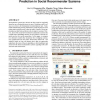Free Online Productivity Tools
i2Speak
i2Symbol
i2OCR
iTex2Img
iWeb2Print
iWeb2Shot
i2Type
iPdf2Split
iPdf2Merge
i2Bopomofo
i2Arabic
i2Style
i2Image
i2PDF
iLatex2Rtf
Sci2ools
RECSYS
2015
ACM
2015
ACM
Overlapping Community Regularization for Rating Prediction in Social Recommender Systems
Recommender systems have become de facto tools for suggesting items that are of potential interest to users. Predicting a user’s rating on an item is the fundamental recommendation task. Traditional methods that generate predictions by analyzing the user-item rating matrix perform poorly when the matrix is sparse. Recent approaches use data from social networks to improve accuracy. However, most of the social-network based recommender systems only consider direct friendships and they are less effective when the targeted user has few social connections. In this paper, we propose two alternative models that incorporate the overlapping community regularization into the matrix factorization framework. Our empirical study on four real datasets shows that our approaches outperform the state-of-the-art algorithms in both traditional and social-network based recommender systems regarding both coldstart users and normal users.
| Added | 17 Apr 2016 |
| Updated | 17 Apr 2016 |
| Type | Journal |
| Year | 2015 |
| Where | RECSYS |
| Authors | Hui Li, Dingming Wu, Wenbin Tang, Nikos Mamoulis |
Comments (0)

